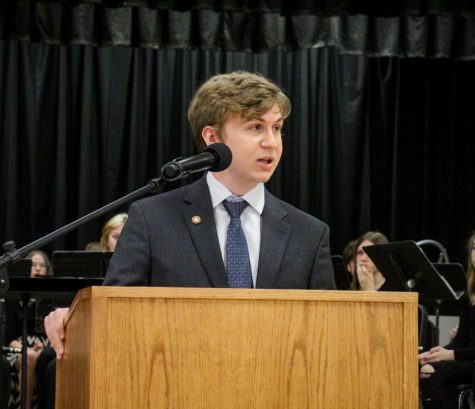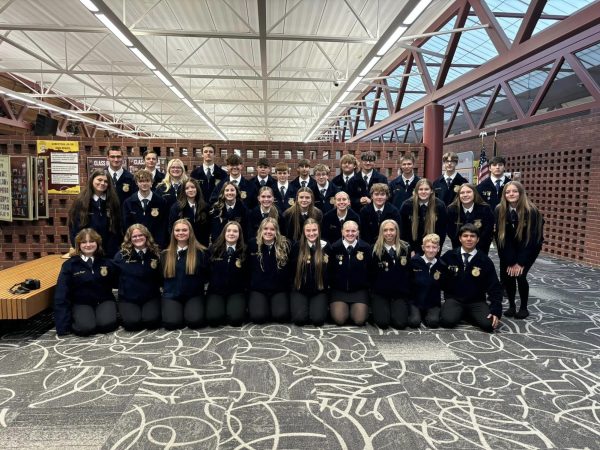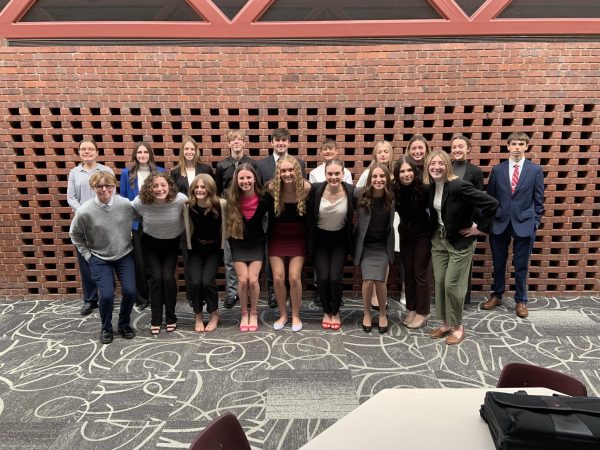- 2022-2023 School Year
- Activities
- Fine Arts and Activities
- Local News
- National News
- News
- Op/Ed
- Showcase
- Story Archives
Student Journalists and Free Speech
MURRAY, Neb. — One Nebraska high school is receiving national attention for shutting down their journalism program and school newspaper after they published articles and editorials on LGBTQ+ issues. The Grand Island Independent reported on Aug. 24th that the 54-year-old Northwest High School newspaper “Saga” was shut down by school administrators.
The closure of “Saga” marks one more blow to student journalists and LGBTQ+ youth in the State of Nebraska. In a separate article, the Grand Island Independent details a record of censorship in Nebraska school journalism programs.
A student at North Platte High School was blocked from publishing on “the school’s racial tension after a Confederate flag was spotted on a student’s truck in the school parking lot.” Her article was later published in the Omaha World-Herald and garnered attention for student journalists in Nebraska.
In January of 2021, Nebraska State Senator Adam Morfeld introduced Legislative Bill 88 to “protect free speech rights of student journalists and student media advisers” according to the Unicameral’s website. Some conservative members of the Nebraska Legislature filibustered the bill during floor debate, preventing it from coming to a vote.
Cass County Senator Rob Clements was among the Senators filibustering the bill. During a debate on March 16, 2021, Sen. Clements questioned whether high school students were “mature” enough to publish without censorship, “I think that in high school, we have students that are not mature.” The legislature adjourned on April 20, 2021, and the bill died along with a shot at the protection of the rights of student journalists.
At the same time, Omaha Westside High School instituted a prior review policy for publications that student journalists objected to according to the Independent.
Nebraska civic organizations and activists have responded to the recent news from Northwest High School. The ACLU of Nebraska wrote on Twitter, “The information here is deeply troubling and we’re taking it seriously. All young people should be able to learn free from censorship and discrimination.”
In March of 2022, the Prowl published an article detailing attacks on LGBTQ+ students in Nebraska and around the country. At the time, Nebraska State Senator Megan Hunt was quoted as saying, “Parents across the country are looking to national, state, and district leaders to support our nation’s students, help them recover from the pandemic and provide them with the academic and mental health support they need. Instead, lawmakers across the country are prioritizing hateful bills that hurt some of the students most in need.”
Earlier that school year, the Prowl had published articles regarding body hate, book bannings, a criticism of the district dress code, and coverage of a student petition to change the dress code. In all cases, student journalists led the way and approached each topic with care and maturity.
The idea that free speech rights don’t extend to student journalists when publishing, which the United States Supreme Court practically declared in the case Hazelwood School District v. Kuhlmeier (1988), is disastrous. Student journalists in Nebraska school districts have proven time and time again their ability to carefully research and craft award-winning stories for their newspapers. In fact, Four students representing The Prowl and Conestoga advanced to state journalism competitions in 2022.
Students bring to light stories that might not otherwise receive media attention. They witness and experience things that even their teachers, parents, and community fail to see. A vast majority of them also think in a more progressive and open-minded way. They reject discrimination, hate, and bigotry in many forms and raise the voices of minorities. All of these things are reasons why the press itself is so important to American Democracy.
Another important function of the press is to hold those in power accountable. However, student journalists are almost entirely prevented from doing this. Censorship prevents student journalists in many school districts from publishing content that criticizes school district officials and content. The Independent also reported on this aspect with a quote from Mike Hiestand at the Student Press Law Center. “By far, the number one thing that will get student media censored is a story that criticizes the school or that administrators somehow think makes them look bad.” Under the current standards, student journalists can not do a critical job of the press in holding officials accountable and amplifying opposing viewpoints.
Whether in Grand Island, North Platte, Omaha, or Murray, student journalists have shown their ability to provide a valuable public service to their peers, community, state, and nation. School districts and elected officials need to put an end to the censorship of student voices. Take it from the Supreme Court, a very different one than decided the Hazelwood case. On Feb. 24, 1969, the court issued a ruling in Tinker v. Des Moines. Students do not “shed their constitutional rights to freedom of speech or expression at the schoolhouse gate.”

Jayden S. is a senior at Conestoga High School. Jayden is the President of the Senior Class, a member of the National Honor Society, Mock Trial, Speech,...








Larry Sparks • Sep 1, 2022 at 2:15 pm
Bravo for a well thought-out and well written editorial. As someone who got his start at Conestoga many years ago and spent most of his life in the newspaper industry, I appreciate the next generation standing up for freedom of the news media. We are always best served when we hear all sides of a story. I’ve also spent more than a decade working with teenagers and can attest that they are mature enough to handle press freedom. Keep up the good work, CHS journalism students!